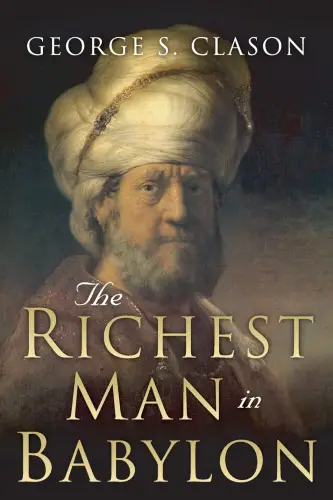The Richest Man in Babylon
Book Author: George Samuel Clason
Summary reviewed by:
Terrence Timmons
Terrence Timmons
Analyst
Bachelor of Arts (BA), University Of California, Santa Barbara 2019
With over 4 years of experience as an analyst. Terrence Timmons is committed to analyzing summaries without compromising on quality.
The Richest Man in Babylon: Summary
Dive into the ancient wisdom that has transformed countless lives, encapsulated in George Samuel Clason's timeless classic, "The Richest Man in Babylon." This masterpiece distills the essence of personal finance through parables set in the heart of ancient Babylon, revealing the enduring principles of wealth accumulation and financial success. If you're on a quest for financial independence, this book holds the key.
The Core Thesis: A Blueprint for Financial Prosperity
At its core, "The Richest Man in Babylon" presents a simple, yet profound, thesis: the road to wealth is navigated through the principles of saving a fraction of one’s earnings, investing wisely, and seeking knowledgeable advice. Clason masterfully intertwines this message within captivating stories, making the wisdom both accessible and engaging.
The Golden Rules of Wealth
Pay Yourself First: A foundational principle that advises individuals to save at least 10% of their income for future needs and investments, before spending on anything else.
Control Your Expenditures: It emphasizes the importance of living within means, advising against succumbing to lifestyle inflation that eats into savings.
Make Money Work for You: Through the tales of Babylon’s citizens, Clason illustrates the power of investments and passive income streams in building wealth.
Guard Your Treasures from Loss: The book advocates for prudent investment strategies, warning against putting money into ventures without adequate security or knowledge.
Own Your Home: Arguing for the stability and financial benefits of homeownership versus renting.
Ensure a Future Income: Planning for retirement and unforeseen circumstances to ensure financial security throughout one’s life.
Increase Your Ability to Earn: Encouraging continuous learning and skill enhancement to boost earning potential.
The Parables: A Blend of Narrative and Knowledge
Through the compelling narratives of characters such as Arkad, the wealthiest man in Babylon, and others facing financial dilemmas, Clason embeds these principles within stories of success and failure. These parables serve not only as engaging tales but also as practical guides for applying the book’s lessons to one’s life.
Why "The Richest Man in Babylon" Stands Out
What sets this book apart is its timeless applicability. Despite being set in ancient Babylon, the principles it espouses are as relevant today as they were thousands of years ago. Clason’s work transcends the boundaries of time and culture, offering universal lessons on financial wisdom that are straightforward yet profound.
The Verdict: A Must-Read for Financial Enlightenment
"The Richest Man in Babylon" is more than just a book; it’s a roadmap to financial enlightenment. Its lessons are simple, but their application is transformative. Whether you’re struggling with financial management or seeking to enhance your wealth-building strategies, Clason’s parables offer invaluable insights. This book is not merely to be read but to be absorbed and implemented, promising not just financial success, but a legacy of wisdom to pass down through generations.
For anyone looking to embark on a journey towards financial independence, "The Richest Man in Babylon" is an essential companion, illuminating the path to wealth with the guiding light of ancient wisdom.
Spoilers (click here to reveal spoilers)
The Richest Man in Babylon: Genres
Self-help
Fiction
Financial
Historical Fiction
Parable
Wisdom literature
The Richest Man in Babylon: Main Characters
Arkad: Renowned as the richest man in Babylon, Arkad embodies the virtue of financial wisdom. He starts as a humble scribe who, through disciplined savings and wise investments, amasses great wealth. His values of frugality, investment, and seeking knowledge underline his journey from modesty to riches.
Bansir: A chariot builder in Babylon who represents the average worker living paycheck to paycheck. His discussions with Kobbi about achieving wealth lead him to seek Arkad’s advice, highlighting the value of seeking wisdom and taking action to improve one’s financial situation.
Kobbi: A musician and friend of Bansir, sharing a similar financial plight. His curiosity and desire to learn from Arkad alongside Bansir show the importance of mentorship and the willingness to change one’s financial destiny.
Dabasir: A former slave who becomes prosperous through the application of financial principles. His story emphasizes redemption, the power of determination, and the capability of anyone to overcome financial missteps and achieve success.
The Richest Man in Babylon: Themes
Financial Wisdom and Discipline: The book emphasizes the importance of acquiring and applying financial knowledge and discipline to save, invest, and spend wisely. Arkad’s journey from a scribe to the richest man in Babylon exemplifies this theme.
The Power of Compound Interest: Illustrated through Arkad’s advice on saving and investing a portion of one’s earnings to allow it to grow over time, demonstrating how wealth builds upon itself.
Personal Responsibility and Self-reliance: Highlighted in Dabasir’s narrative, which shows his journey from debt to prosperity through disciplined repayment and budgeting.
Generosity and Philanthropy: While accumulating wealth is a significant focus, the book also touches on the importance of using wealth to help others, as seen in Arkad’s teachings and actions towards his fellow Babylonians.
The Pursuit of Knowledge: The book values continuous learning and seeking advice from those who are financially successful, as demonstrated by Bansir and Kobbi seeking Arkad’s guidance.
The Richest Man in Babylon: What You Need to Know
(Contains Spoilers: Perfect for readers seeking a quick review.)
"The Richest Man in Babylon" unfolds through a series of parables centered around Babylonians who learn and apply financial principles to improve their lives. These stories, set against the backdrop of ancient Babylon, collectively convey the book's teachings on personal finance.
Arkad's Ascension: The narrative begins with Arkad, who shares his wisdom on accumulating wealth with fellow Babylonians eager to learn. His principles of saving at least ten percent of one’s income, investing wisely, and protecting wealth from loss form the cornerstone of his teachings.
The Tale of the Chariot Builder: Bansir, a chariot builder, finds himself living day to day despite his hard work. His encounter with Arkad leads him on a path to financial security through disciplined saving and investing.
Kobbi's Journey: As a musician, Kobbi faces similar financial challenges as Bansir. Together, they seek Arkad’s counsel, highlighting the theme of mentorship and the transformative power of financial education.
Dabasir’s Redemption: Dabasir’s story from a slave to a wealthy man underscores the themes of personal responsibility and the ability to change one’s circumstances. His adherence to a strict budget to repay his debts and his subsequent wealth accumulation illustrate the potential for financial recovery and success.
The Five Laws of Gold: Arkad outlines these laws as saving a minimum of one-tenth of earnings, investing wisely, ensuring investments are secure, being cautious about investment advice, and investing in oneself to increase earning capacity.
The Clay Tablets: The story concludes with the discovery of clay tablets in a ruined tower, which reveal the secrets to wealth that Arkad imparted. These tablets, symbolizing knowledge preservation and transmission, ensure that the wisdom of Babylon endures.
Through these interconnected tales, "The Richest Man in Babylon" offers timeless advice on financial planning, the importance of saving, and the wise investment of resources. Clason’s work, while fictional, serves as a practical guide to personal wealth management and financial independence.


The Richest Man in Babylon
Date Published: 1926
Disclaimer: As an Amazon Associate I earn from qualifying purchases.




